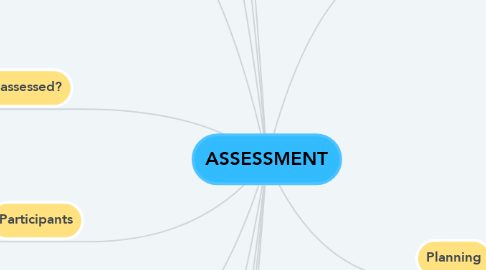ASSESSMENT
by Aneta Węgierak


1. Types
1.1. Pre - assessment
1.2. Formative assessment
1.2.1. assessment for learning
1.3. Summative assessment
1.3.1. assessment of learning
1.4. Self assessment
1.4.1. Student self assessment
1.4.2. teacher self assessment
2. Planning
2.1. What will students learn?
2.1.1. What should they learn? - curriculum
2.1.2. Set the goals
2.1.2.1. individual goals
2.1.2.2. group goals
2.2. How will we know that the learning has occurred?
2.3. How will we collect the evidence of learning?
2.3.1. observations checklists
2.3.2. portfolios
2.3.3. worksheets
2.3.4. oral tasks
2.4. What activities will help them to learn?
2.5. How will students receive feedback?
2.6. What happens after feedback?
3. Types
3.1. Informal
3.2. Formal
4. Types
4.1. Subjective
4.2. Objective
5. Forms
5.1. Spoken
5.2. Written
6. Purpose
6.1. To check students knowledge
6.2. To motivate students
6.3. To assign the reports
6.4. To help students set learning goals
6.5. TO PROVIDE FEEDBACK ON THE LEARNING PROCESS
7. School obligations
7.1. develop assessment procedures
7.2. develop assessment methods
8. Participants
8.1. Students
8.2. Teachers
8.3. Parents
9. What is assessed?
9.1. the process of inquiry
9.2. the products of inquiry
10. Assessment component
10.1. assessing
10.1.1. how we discover what students know and have learned
10.2. recording
10.2.1. how we choose to collect and analyse data
10.3. reporting
10.3.1. how we choose to communicate information
10.3.1.1. conferences
10.3.1.1.1. teacher-student
10.3.1.1.2. teacher-parent
10.3.1.1.3. student-led
10.3.1.1.4. three way
10.3.1.2. the written report

